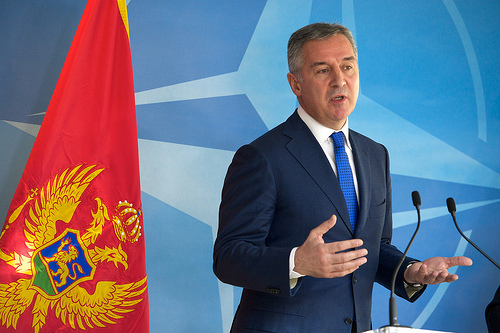 Vladimir Putin’s Kremlin has been adamantly opposed to further NATO enlargement. Following NATO’s invitation to Montenegro, Russian officials immediately asserted that they would be forced to react. But it is unclear what steps Moscow could take, as no European state seeks membership in organizations that Russia dominates, such as the Eurasian Economic Union or the Collective Security Treaty Organization, and many former Soviet republics are seeking closer ties with the West as protection against Russia.
Vladimir Putin’s Kremlin has been adamantly opposed to further NATO enlargement. Following NATO’s invitation to Montenegro, Russian officials immediately asserted that they would be forced to react. But it is unclear what steps Moscow could take, as no European state seeks membership in organizations that Russia dominates, such as the Eurasian Economic Union or the Collective Security Treaty Organization, and many former Soviet republics are seeking closer ties with the West as protection against Russia.
Quite possibly, the Kremlin may endeavor to destabilize the Western Balkans by supporting Serbian separatism in Montenegro and Bosnia-Herzegovina or by stirring inter-ethnic conflicts in Macedonia and Kosovo. But Russia possesses no committed allies in the region and even Serbia uses Russia for diplomatic and economic purposes rather than having any ideological, political, or strategic commitments to the Kremlin….
NATO interests throughout the Balkans have come into sharper relief since the onset of the war in Ukraine and the stark reality that forcible partition, territorial acquisition, and military aggression are realities that persist into the 21st century. To counter such temptations, the entire West Balkan zone needs to join the rest of the peninsula under the NATO umbrella.
As Central Europe has demonstrated, NATO accession enhances regional security, solidifies existing borders, promotes democratic consolidation, attracts foreign investment, and improves each country’s economic prospects. It will also help neutralize Moscow’s attempts to sow discord and conflict in the region, efforts designed to preoccupy Western capitals and shift attention away from its ambitions in the post-Soviet neighborhood….
Montenegro’s inclusion in NATO represents a congruence of both interests and values. NATO is not only a military alliance, but also a community of democracies membership in which brings several practical domestic and regional benefits. Accession will eliminate any doubts about Montenegro’s future and encourage Western investment, rather than the corrupt and politically linked Russian investment witnessed in recent years. It will bring the entire Adriatic coastline within the NATO zone and thereby assist in joint operations and interoperability in such endeavors as emergency response, humanitarian assistance, anti-smuggling, and anti-terrorist coastal patrols. In addition, it will boost confidence in Montenegro during its already advanced accession talks into the European Union.
Montenegro’s membership will also encourage Serbia to look toward a NATO future. While this will necessitate a political decision by Belgrade, Serbia’s military appears to support NATO entry, as membership would help modernize the armed forces. Montenegro can also encourage Bosnia-Herzegovina to push toward accession and move Kosovo in the same direction as it develops its security structure. Additionally, a new initiative is needed to bring Macedonia into NATO and overcome the veto that Greece continues to wield in opposition to the country’s name.
Janusz Bugajski is a Senior Fellow at the Center for European Policy Analysis (CEPA) in Washington, DC. Srdjan Darmanovic is Montenegro’s ambassador to the United States, and this article reflects his views and not necessarily those of the government of Montenegro.
Image: Prime Minister of Montenegro, Milo Djukanovic, March 25, 2014 (photo: NATO)
